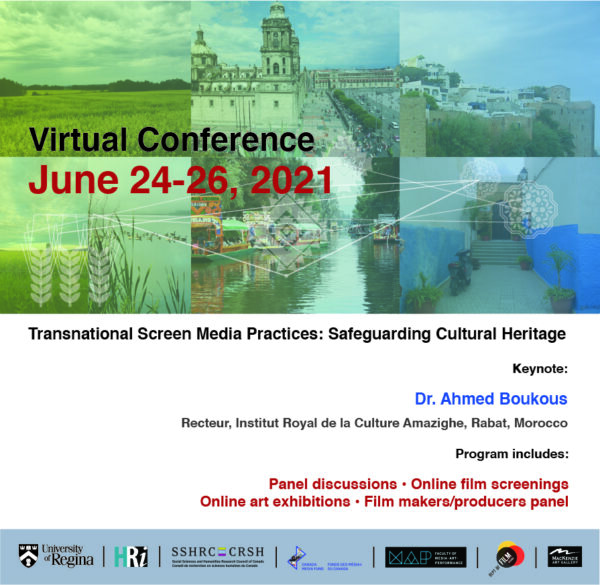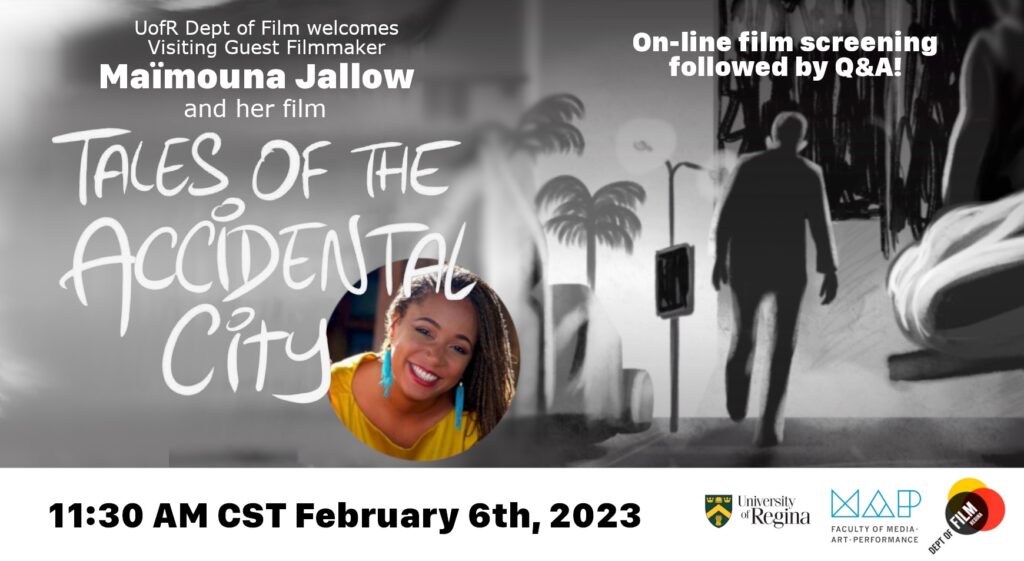Dr Sheila Petty, FRSC
SaskPower Research Chair in Cultural Heritage
Film, Culture and Heritage (2022-2024)

“The overall goal of my research program in film, culture and heritage is to lead dialogue and practice concerning living cultural heritage, memory, and identity politics in globalizing cultures, political and cultural sovereignty, control of representation in image production, and modes of resistance to colonialism in African screen media”, she says.
“I am interested in what happens to knowledge, cultural expressions and creative forms that arise in Africa and then travel around the globe ending up in different geographical locations and reconfigured to local contexts”.
These are the research projects Professor Petty is currently involved in:
Moroccan Amazigh Cinema and Cultural Heritage
Film festivals and transnational flows of living cultural heritage: Africa in the world
Decolonizing film festival research in a post-pandemic world
About the projects
This original research project offers a new understanding of the role of cultural heritage in Moroccan Amazigh cinema, the importance of cinema as a medium of transmission of this cultural heritage and Amazigh cinema’s importance and influence within North African and world cinema contexts. At its core the primary objectives are to conceptualize how Amazigh cultural heritage is retained and reflected in Amazigh film and video texts produced within Morocco and in its diaspora. It provides new interpretations of (1) the origins and history of Moroccan Amazigh film and video from the beginning to present-day; (2) the reflections of tangible and intangible cultural heritage in Moroccan Amazigh films and videos in their foundation in oral tradition, and their borrowings from literature, painting, music, theatre and performative gestures and their use of space and time; and (3) the lives (production contexts) and afterlives (audiences, festivals, distribution and exhibition) of Moroccan Amazigh film and video.
RESEARCH OUTPUTS
Conference Presentation:
Reclaiming Indigenous Cultural Heritage in Moroccan Amazigh Film and Video, Sheila Petty and Brahim Benbouazza, A Light Footprint in the Cosmos Conference, Simon Fraser University, Vancouver, and online. 25 June 2022.
This presentation focuses on decolonizing practices in Indigenous film production in Morocco. We examine the potential of Indigenous structures of analysis for reclaiming Indigenous cultural heritage through media such as film and video. For many years, and especially under the rule of Hassan II, manifestations of Amazigh identities were forbidden, although later in his reign Hassan II encouraged Moroccans to embrace the Tashelhit, Tamazight, or Tarifite languages rather than French. By the 1990s, Amazigh activists began to challenge the nature of Moroccan identity by reclaiming Amazigh aspects of identity. This activism spilled over into all cultural industries and Amazigh films gained popularity beginning with the production of Tamghart wurgh/Femme d’or/Golden Woman in 1993. Other popular films since then include Al Malaika la tuhaliq fi al-dar albayda/ In Casablanca Angels Don’t Fly, 2004, Itto Titrit/Morning Star, 2010, Adios Carmen, 2013, Tigmi N Igren/House in the Fields, 2017, and Monsters, 2019. We are especially interested in exploring how Amazigh cultural sovereignty is expressed narratively and aesthetically in the films and how Amazigh ideology and languages are structuring principles of the films.
Forthcoming publications:
“Tinghir-Jerusalem: Echoes of the Mellah as Road ‘Memory Film'” by Sheila Petty and Brahim Benbouazza, forthcoming in Ancient Modes, Modern Means: an Introduction to Contemporary Amazigh Cinema, eds, Lucy McNair and Yahya Laayouni, University of Regina Press, 2025.
“Moroccan Amazigh Cinema” forthcoming in Routledge Handbook on Arab Cinema, ed. Noha Mellor, 2024.
This project draws upon research supported by the Social Sciences and Humanities Research Council of Canada (SSHRC).
Insight Grant: 435-2021-0298; $91,756; 2021-2024

This transnational partnership represents a strategic alliance between researchers in academic institutions in Canada, the US, Europe and South America and festival/community partners committed to investigating how flows of knowledge that arise from the African continent arrive at North and South American and European-based African and Amazigh film festivals and are realised/transformed through new contexts of presentation and engagement in new locations. We investigate potential methods of catalyzing a “transnational flow” from inception to end that involves attention to process in the form of an open-ended platform, rather than studying festivals as static cultural products with discrete and isolated categories of programming, presentation, documentation, and networking.
This partnership leads dialogue and practice concerning living cultural heritage, memory and identity politics in globalizing cultures, political and cultural sovereignty, control of representation in image production, and modes of resistance to colonialism. Within this overall goal of mutually discovering best practices for safeguarding local and transnational living cultural heritage, the partnership is driven by three central goals: 1) Promoting education and understanding of expressions of living cultural heritage in screen media; 2) Enhancing access to local and transnational living cultural heritage; and 3) Safeguarding living cultural heritage as process, rather than essentialized product. The partnership began with a virtual symposium in Regina in spring 2021, and led to an expanded symposium at Vues d’Afrique in 2023. An edited volume on the project is forthcoming.
RESEARCH OUTPUTS
Podcast series for the Humanities Research Institute, University of Regina
Episode: African Film Festivals, Collaborative Curatorship and Cultural Heritage (part 1 and part 2)
with Dr. Sheila Petty, Dr. Estrella Sendra Fernandez, Dr. Ana Camila Esteves, Dr. Ben Akoh
LISTEN HERE
Case study of a transnational flow
African director Maimouna Jallow and her film “Tales of the Accidental City” (2021) embarked on a journey, spanning across continents, as a direct outcome of the collaborative curatorial process initiated by the festivals participating in this research. This transnational flow of cinematic work spans across borders, reaching audiences in Brazil and Canada. This dynamic collaboration showcases the global reach and interconnectedness of contemporary film festivals, transcending geographical boundaries and fostering cultural exchange and dialogue.
Maimouna Jallow participated on the following:
* Mostra de Cinemas Africanos, São Paulo and Curitiba, Brazil, July 2022
* African Movie Festival in Manitoba, Winnipeg, Canada, September 2022
* Vues d’Afrique, Montreal, Canada, April 2023
The filmmaker also participated on an online screening of her film hosted by the University of Regina and the Regina Public Library, Canada, February 2023.
International Conference in Montreal, held in conjuction with Vues d’Afrique (April 2023)
During the 2023 edition of Vues d’Afrique in Montreal, we seized the opportunity to convene representatives from all the festivals involved in our research project. As part of the international conference organized by the Toronto, McMaster, Regina, and Victoria Universities, we hosted two engaging roundtable discussions. These roundtables were incorporated into the program of the conference and provided a platform for insightful discussions and knowledge sharing among participants from various festivals and academic institutions.
The roundtable titled “Film Festivals and Transnational Flows of Living Cultural Heritage: Africa in the World” occurred on April 27, 2023, featuring the following speakers:
* Kotimi Guira and Gérard Le Chêne (Vues d’Afrique)
* Ben Akoh (African Movie Festival in Manitoba AM-FM)
* Ana Camila Esteves (Mostra de Cinemas Africanos – MCA and King’s College London)
Representatives of New York Forum of Amazigh Film – NYFAF:
* Lucy McNair (City University of New York, LaGuardia CC)
* Habiba Boumlik (City University of New York, LaGuardia CC)
* Yahya Laayouni (Bloomsbury University)
* Soubeika (Wafa) Bahri (University of Colorado, Denver) (New York Forum of Amazigh Film – NYFAF)
On April 28, 2023, the roundtable “Transatlantic Curatorial Experience” provided an overview of the festivals participating in this research, with each of their directors presenting their insights. Professor Sheila Petty delivered a paper outlining the roots of this research and its accomplishments up to that point. The case study of Maimouna Jallow was a central topic of discussion, and the filmmaker herself was present to enrich the conversation.
This project draws upon research supported by the Social Sciences and Humanities Research Council of Canada (SSHRC) Partnership Development Grant. $169,534; 890-2020-0102 (2021-2024)


“Decolonizing Film Festival Research in a Post-Pandemic World” proposes a first step in the process of decolonizing film festival research by bringing together an international team of African film festival researchers to investigate methods to decolonize festival research. The team will design and trial an innovative and accessible two part Decolonial Test, able to: 1) Identify potential unconscious bias in the research design itself; and 2) Develop a series of justice, equity, diversity and inclusion variables that can foster inclusive, dialogical and polycentric ways of knowledge production and dissemination which will in turn ensure ownership of the process for communities concerned.
Funding Body: New Frontiers in Research Fund, Government of Canada
Project Title: Decolonizing Film Festival Research in a Post-Pandemic World
Amount: $237,779 [NFRFR-2021-00161]
Period: March 2022 – May 2024
Dr. Sheila Petty – Nominated Principal Investigator, University of Regina (Canada)
Dr. Estrella Sendra – Co-principal Investigator, King’s College London (UK)
RESEARCH COLLABORATORS
- Dr Gabriela Almeida (Graduate Program in Communication and Consumption Practices, PPGCOM ESPM, Brazil)
- Laura Feal (Hahatay Association, Centre Culturel Suñu Xarit Aminata, Senegal)
- Dr Ben Akoh (Manitoba African Film Festival Inc., Canada)
- Dr Rachel Johnson (University of Leeds)
- Dr Robin Steedman (Copenhagen Business School, Denmark)
- Professor Lindiwe Dovey (Screen Worlds, SOAS, University of London, United Kingdom)
OFFICIAL WEBSITE OF THE PROJECT: https://research.uregina.ca/dffr/
This project draws upon research supported by the Government of Canada’s New Frontiers in Research Fund (NFRF).
Other research activities
Traveling Aesthetics in African Cinema – book manuscript in progress for University of Toronto Press
Habiba Djahnine: Memory Bearer – Visionaries Feminist Filmmakers book series – book manuscript in final stages for Edinburgh University Press
Outsiders on the Inside: Rokhaya Diallo’s Les marches de la liberté as Activist Documentary, by Sheila Petty in Francophone African Women Documentary Filmmakers: Beyond Representation. Edited by Suzanne Crosta, Sada Niang and Alexie Tcheuyap, Bloomington: Indiana University Press, 2023; pp. 34-49.
Reset Mode: African Digital Videos as Expanded Cinema for World Cinema on Demand, edited by Alexander Fisher and Stefano Baschiera, London and New York: Bloomsbury Academic, 2022:169-186.
“Irreducible Memories” of Caribbeanness in Mariette Monpierre’s Le Bonheur d’Elza (2011) in The Film Archipelago: Islands in Latin American Cinema, edited by Antonio Gomez and Francisco-J. Hernandez Adrian, London and New York: Bloomsbury Academic, 2022: 229-246.
Interstitial Spaces and Sites of Struggle: Displacement, Identity, and Belonging in Contemporary French Accented Cinema, Mashriq & Mahjar: Journal of Middle East and North African Migration Studies, 9, no. 1 (2022), pp. 121-143.
2022 African Movie Festival , Gas Station Arts Centre in Winnipeg, Manitoba, 23–25 September 2022, Reviewed by Giovana Nabarrete de Souza Cruz, University of Regina, Babatunde Onikoyi, University of Regina, and Sheila Petty, University of Regina, Journal of African Cinemas, Spring 2023.
African Ecomedia: Network Forms, Planetary Politics by Cajetan Iheka, Journal of Cinema and Media Studies, 62.2, Winter 2023: 204-207.
Petty, S. (2022). Mostra de Cinemas Africanos 2021: Focus on Algeria, African Studies Review, 1-7. doi:10.1017/asr.2022.88
Petty, S. (2022). Philippe Lacôte, director. Night of the Kings. 2020. Original title: La nuit des rois. 93 minutes. French, Dioula, Nouchi (with English subtitles). Ivory Coast/France/Canada/Senegal. Banshee Films. Price not reported. African Studies Review, 65(2), E60-E61. doi:10.1017/asr. June 2022.24
« Ousmane Sembène : le tailleur d’Afrotopies » with Dr. Estrella Sendra, Colloque “Ousmane Sembene: Hétérotopies de Possibles,” Université Gaston Berger de Saint-Louis du Sénégal, May 18-20, 2023.
“Alter(ing)native Narratives: Disability, Agency and Human Rights. Discourse in African Cinemas,” with Babatunde Onikoyi, Marginality and Fragility in African Cinemas, Vues d’Afrique, Montreal, April 26-27, 2023.
“Habiba Djahnine: expanding Algerian feminist film heritage,” Feminist Film Heritage: Expanding the World’s Film Archives, Second Global Networking Symposium “Women’s Global Film Movements and Networks” 5 – 7 January 2023.
“African cinema and urbanism: cities, landscape and screen media- the moving image,” Marie-Paule Macdonald, University of Waterloo and Sheila Petty, University of Regina. SEAC-SSAC – Society for the study of Architecture in Canada, Université du Québec à Montréal, Montreal, Quebec, May 25–28, 2022.
“‘Performing Algerianness’ in Recent Algerian Women’s Documentary Films,” Film Studies Association of Canada, virtual CONGRESS 2022, May 12-15, 2022.
 This event was a free and open-access conference that welcomed both the general public and academic audiences. It featured panelists hailing from Canada, Mexico, and Morocco, and attracted participants from diverse regions, including Canada, Hawaii, Europe, Africa, Iran, and India. The conference served as a vibrant platform for fostering dialogue and facilitating exchanges on various pressing topics. These discussions revolved around living cultural heritage, identity politics in the context of globalization, issues of political and cultural sovereignty, control over representation in image production, and strategies of resistance to colonialism.
This event was a free and open-access conference that welcomed both the general public and academic audiences. It featured panelists hailing from Canada, Mexico, and Morocco, and attracted participants from diverse regions, including Canada, Hawaii, Europe, Africa, Iran, and India. The conference served as a vibrant platform for fostering dialogue and facilitating exchanges on various pressing topics. These discussions revolved around living cultural heritage, identity politics in the context of globalization, issues of political and cultural sovereignty, control over representation in image production, and strategies of resistance to colonialism.
The event also included film screenings and participants shared pre-recorded videos of their papers, bringing together a diverse audience that encompassed individuals from the media industry (such as the Canada Media Fund and Banff Institute), scholars, and filmmakers. This symposium, along with the film screenings, effectively united professionals, media artists, cultural practitioners, industry funders, and policymakers from different corners of the world. They collectively grappled with shared challenges and concerns related to the preservation, presentation, and documentation of living cultural heritage within the realm of screen media.
The event was sponsored by the University of Regina, the Social Sciences and Humanities Research Council of Canada, the Canada Media Fund, and the MacKenzie Art Gallery in Regina. Social Sciences and Humanities Research Council of Canada, Connections Grant: $46,607: 611-0307-2019 (2020) for Transnational Screen Media Practices: Safeguarding Cultural Heritage,” S. Petty, principal investigator; C. Marsh, co-investigator.
You can access the official website of the event by following this LINK where you can find an archive containing all the pre-recorded presentations, the complete program, and detailed biographies of the participants.



